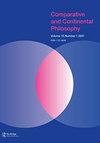Ethnocentrism in Esoteric Circles: On Political Gnoseology
IF 0.3
0 PHILOSOPHY
引用次数: 0
Abstract
ABSTRACT This essay is dedicated to Elliot Wolfson’s new book on Heidegger and Kabbalah. Wolfson’s project is read here as a philosophical reflection and scholarly intervention on the “and,” that is, on pluralism in thought. Wolfson juxtaposes Heideggerian and kabbalistic corpora as expressing the same conception of non-totalitarian, plural thought, and criticizes both Heidegger and Kabbalah for betraying this pluralism in their ethnocentric tendencies. As a scholarly “ethical corrective,” Wolfson indicates in both corpora a countermeasure: A Gnostic disengagement of thought from politics, in favor of poetics. The essay critiques this corrective by pointing at the different constellations of Gnosis and politics in Heidegger and Kabbalah.秘传界的种族中心主义:论政治灵知学
本文献给沃尔夫森关于海德格尔与卡巴拉的新书。沃尔夫森的项目在这里被解读为对“和”的哲学反思和学术干预,也就是说,对思想的多元化。沃尔夫森将海德格尔和卡巴拉主义语料库并列为表达非极权主义、多元思想的同一概念,并批评海德格尔和卡巴拉赫在其种族中心主义倾向中背叛了这种多元性。作为一种学术性的“伦理矫正”,Wolfson在两本语料库中都指出了一种对策:诺斯替主义的思想与政治的脱离,有利于诗学。本文通过对海德格尔和卡巴拉的不同的Gnosis和政治星座的批判,对这一修正进行了批判。
本文章由计算机程序翻译,如有差异,请以英文原文为准。
求助全文
约1分钟内获得全文
求助全文

 求助内容:
求助内容: 应助结果提醒方式:
应助结果提醒方式:


